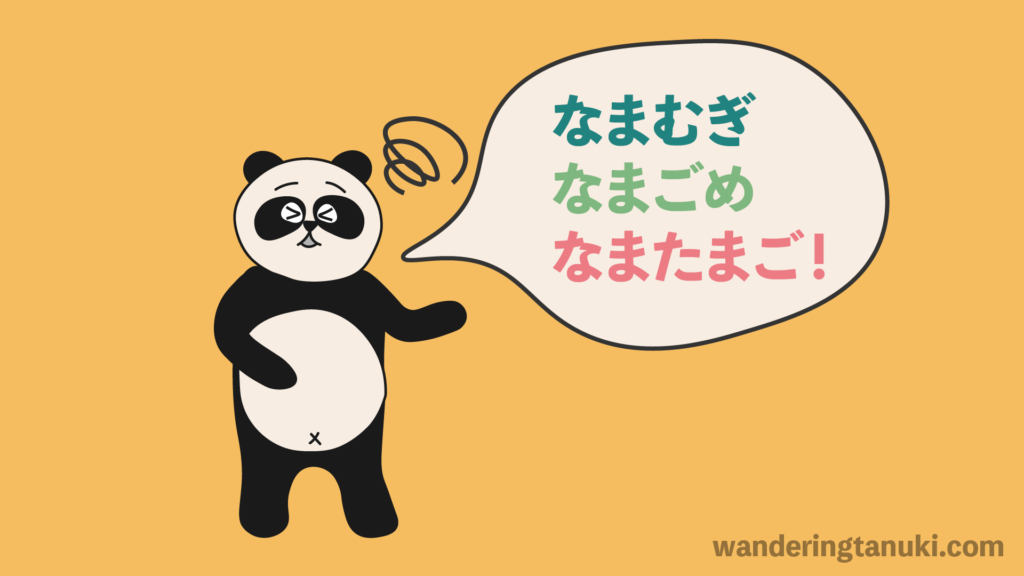20 Japanese Tongue Twisters: Hayakuchi kotoba
Japanese tongue twisters can be a great way to practice your pronunciation! It’s also fun to learn the meanings of these difficult phrases. In Japanese, tongue twisters are called 早口言葉 (hayakuchi kotoba) meaning “fast mouth words”. I recommend that you first practice them slowly, and try to build up the speed. For shorter ones, try and repeat them multiple times.

By doing a few of these per day, I’m sure you’ll notice an improvement on the way you speak Japanese! Each tongue twister or hayakuchi kotoba will include a slower audio clip so you can practice.
1. 赤パジャマ黄パジャマ茶パジャマ
Pronunciation: Aka pajama ki pajama cha pajama
Meaning: Red pajama, yellow pajama, brown pajama
Challenges: In this Japanese tongue twister, it’s difficult because of the back and forth between the sounds じゃ (ja), ちゃ (cha), and ま (ma).
2. 生麦生米生卵
Pronunciation: Nama mugi nama gome nama tamago
Meaning: Raw wheat, raw rice, raw egg
Challenges: This is a bit easier than some of the other ones, so you’ll want to practice making it faster. The tricky part is in the ま(ma), む(mu), ぎ(gi), and ご(go) sounds.
3. 隣の客はよく柿食う客だ
Pronunciation: Tonari no kyaku wa yoku kaki kuu kyaku da
Meaning: The customer next to me eats a lot of persimmons.
Challenges: In this difficult Japanese tongue twister, you’ll get practice with the sounds く(ku), きゃ (kya), and か (ka).
4. かえるぴょこぴょこみぴょこぴょこ、合わせてぴょこぴょこむぴょこぴょこ
Pronunciation: Kaeru pyoko pyoko mi pyoko pyoko awasete pyoko pyoko mu pyoko pyoko
Meaning: Frog jumps three times, together it’s six.
Challenges: Some challenges with this tongue twister is saying the word ぴょこ (pyoko) many times. The word is an onomatopoeia for the sound of jumping.
5. スモモも桃も桃のうち
Pronunciation: Sumomo mo momo mo momo no uchi
Meaning: Plums and peaches are both like peaches.
Challenges:This is a great one to practice the sound of も (mo). Be careful to say も(mo) the correct number of times!
6. バス ガス 爆発
Pronunciation: Basu gasu bakuhatsu
Meaning: Bus, gas, explosion
Challenges: In this Japanese tongue twister, you can practice the sounds ば (ba) and が (ga).
7. 青巻紙 赤巻紙 黄巻紙
Pronunciation: Ao maki gami, aka maki gami, ki maki gami
Meaning: Blue rolled paper, red rolled paper, yellow rolled paper
Challenges: This is an easier one that is fun to say. Try and challenge yourself by saying it faster and faster.
8. 庭には鶏が二羽いました。
Pronunciation: Niwa ni wa niwatori ga niwa imashita.
Meaning: There are two chickens in the yard.
Challenges: You can practice saying the two sounds に (ni) and わ (wa) in this tongue twister.
9. 肩たたき機
Pronunciation: Katatatakiki
Meaning: Shoulder massage machine
Challenges: This is a great one to practice the sound た (ta) in Japanese.
10.東京特許許可局
Pronunciation: Toukyou tokkyo kyoka kyoku
Meaning: Tokyo patent permit office
Challenges: In this famous Japanese tongue twister, you can practice the two sounds きょ (kyo) and きゃ (kya).
11. 摘出手術
Pronunciation: Teki shutsu shujutsu
Meaning: Extraction surgery
Challenges: This word is difficult to say because of the two sounds しゅ (shu) and じ (ju) sounding very similar.
12. バナナの謎はまだ謎なのだぞ
Pronunciation: Banana no nazo wa mada nazo nano dazo
Meaning: The mystery of the banana is still a mystery
Challenges: In this tongue twister, you’ll be able to practice the sounds な (na), ぞ (zo), and だ (da).
13. あの子もこの子もとも子の子
Pronunciation: Anoko mo konoko mo tomoko no ko
Meaning: That child and this child are Tomoko’s kids.
Challenges: In this funny sentence, you’ll get to practice saying the sounds も (mo),の (no), and こ (ko).
14. この寿司は少し酢が効きすぎた。
Pronunciation: Kono sushi wa sukoshi su ga kiki sugita.
Meaning: This sushi has a bit too much vinegar
Challenges: This tongue twister can allow you to practice the す (su) and し (shi) sounds.
15. にゃんこ 子ニャンコ 孫にゃんこ
Pronunciation: Nyanko ko nyanko mago nyanko.
Meaning: kitty, baby kitty, grandbaby kitty
Challenges: In this cute phrase, you can practice the sound にゃ(nya) which can be difficult.
16. 低所得者層
Pronunciation: Teisho tokusha sou
Meaning: Low income group
Challenges: This word can be difficult because of the sounds しょ(sho), しゃ (sha), and そ (so). Challenge yourself by trying to say it faster and faster!
17. 油アルバム
Pronunciation: Abura arubamu
Meaning: Oil album
Challenges: Although this phrase doesn’t mean anything, it uses two words that are hard to say together. Pay special attention to the ら (ra) and る(ru) sounds.
18. 魔術師 魔術修業中
Pronunciation: Majutsushi majutsu shugyou chuu
Meaning: A magician is currently training in magic
Challenges: The three challenging sounds in this phrase are じゅ(ju), しゅ (shu), and ちゅ(chu).
19. 地図帳でチェジュ島探し
Pronunciation: Chizu chou de che ju tou sagashi.
Meaning: Looking for Jeju island in a map book.
Challenges: Some of the challenging sounds in this Japanese tongue twister are the sounds ち (chi), ちょ(cho), ちぇ (che), and じゅ(ju).
20. 右目右耳 右耳右目
Pronunciation: Migime migi mimi migi mimi migi me
Meaning: Right eye right ear right ear right eye
Challenges: This one can be a challenge to keep up with all of the words. Try to say it slowly first and faster.
How did you do with these Japanese tongue twisters? Speaking Japanese can use different parts of the mouth than you’re used to. Hopefully these hayakuchi kotoba can help you to improve your pronunciation to achieve fluency! If you’re interested in other Japanese language learning blog content, be sure to check out How to order coffee at a coffee shop in Japanese or How to Introduce Yourself in Japanese
~Tanuki






jugemu jugemu gokou no surikire kaijarisuigyo no suigyomatsu unraibmatsu furaimatsu ku neru tokoro ni sumu Tokoro yabura koji no Bura koji paipo-paipo paipo no shuringan shuringan no gurindai gurindai no ponpokopi no ponpokona chokyumri no chosuke
Wow that’s cool that you know jugemu jugemu! 🙂